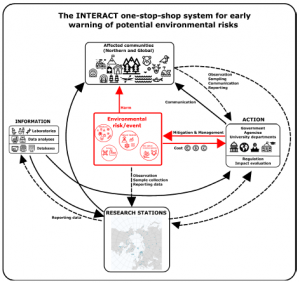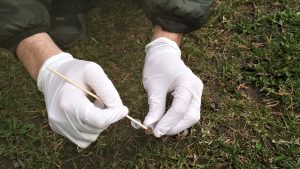Managing risks
Rapid response to environmental emergency alerts
 The overall main objective of the Work Package is to help protect ArcticDefinitions of the Arctic vary according to environmental, geographical, political, cultural and scientific perspectives. Some scientists define the Arctic as areas having a high latitude, long winters, short, cool summers,... More and global residents from the hazards of potential future environmental emergencies such as release of radionuclides, contamination events from atmospheric deposition, volcanic ash, extreme climateThe average weather we would expect over a long period of time (seasons, years, decades). Climate varies from place-to-place across the Earth. Climate is determined by long-term (over at least... More events including possible severe ozone depletion, as well as spread of pathogens, disease and invasive species.
The overall main objective of the Work Package is to help protect ArcticDefinitions of the Arctic vary according to environmental, geographical, political, cultural and scientific perspectives. Some scientists define the Arctic as areas having a high latitude, long winters, short, cool summers,... More and global residents from the hazards of potential future environmental emergencies such as release of radionuclides, contamination events from atmospheric deposition, volcanic ash, extreme climateThe average weather we would expect over a long period of time (seasons, years, decades). Climate varies from place-to-place across the Earth. Climate is determined by long-term (over at least... More events including possible severe ozone depletion, as well as spread of pathogens, disease and invasive species.
Specifically, we aim to establish a process starting with alerting research station staff through the ArcticDefinitions of the Arctic vary according to environmental, geographical, political, cultural and scientific perspectives. Some scientists define the Arctic as areas having a high latitude, long winters, short, cool summers,... More and adjoining territories to possible environmental emergencies via a one-stop-shop, through providing protocols on how to make infrastructure–wide observations and/or sampling, determining how samples should be transported, identifying laboratories to analyse resulting data and/or samples and identifying the pathways to ensure data reach appropriate environmental agencies and government departments that can respond to emergencies based on geographically comprehensive sampling. Finally, we aim to identify how the system developed can be sustained in the long term.

The service we offer is particularly important considering that our sites are located throughout the northern hemisphere’s most remote and environmentally harsh environments where observing power is very low but where the research station staff has access and the expertise and ability to operate in these conditions.

Trial run: Distribution of mosquito-borne diseases in the Arctic
In cooperation with the Laboratory of Arbovirologyat the Institute of Parasitology, BiologyThe study of life and living organisms (from the Greek word 'bios' meaning life).... More Centre of the Czech Academy of Sciences, we will be testing the the prevalence of selected tick and mosquitoes-borne diseases in the ArcticDefinitions of the Arctic vary according to environmental, geographical, political, cultural and scientific perspectives. Some scientists define the Arctic as areas having a high latitude, long winters, short, cool summers,... More using the iNTERACT station network. This will help to create the baseline for the monitoring of future shifts in the distribution of selected diseases. Please, contact us if you would like to get involved in this study.
-
D6.1 Report on the Rapid response action plan
application/pdf
-
D6.2 Refined action plan including experience from a field trial
application/pdf
